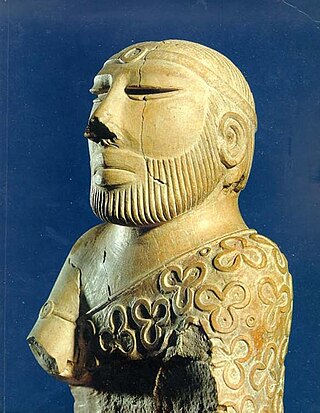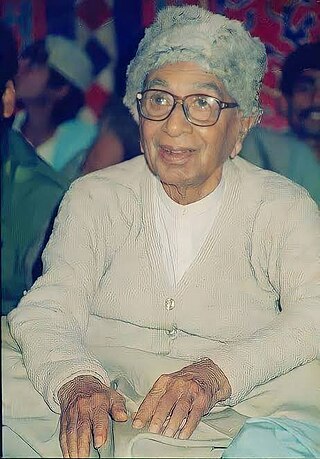Sindhi may refer to:
- something from, or related to Sindh, a province of Pakistan
- Sindhi people, an ethnic group from the Sindh region
- Sindhi language, the Indo-Aryan language spoken by them
Sindhi may refer to:

Sindh is a province of Pakistan. Located in the southeastern region of the country, Sindh is the third-largest province of Pakistan by land area and the second-largest province by population after Punjab. It is bordered by the Pakistani provinces of Balochistan to the west and north-west and Punjab to the north. It shares an International border with the Indian states of Gujarat and Rajasthan to the east; it is also bounded by the Arabian Sea to the south. Sindh's landscape consists mostly of alluvial plains flanking the Indus River, the Thar Desert in the eastern portion of the province along the international border with India, and the Kirthar Mountains in the western portion of the province.

Sindhi is an Indo-Aryan language native to the Pakistani province of Sindh, spoken by over 34 million people, where it has official status. It is also spoken by a further 1.7 million people in India, where it is a scheduled language, without any state-level official status. The main writing system is the Perso-Arabic script, which accounts for the majority of the Sindhi literature and is the only one currently used in Pakistan. In India, both the Perso-Arabic script and Devanagari are used.

Sindhis are an Indo-Aryan ethnolinguistic group who speak the Sindhi language and are native to the Pakistani province of Sindh. The historical homeland of Sindhis is bordered by the southeastern part of Balochistan, the Bahawalpur region of Punjab and the Kutch region of Gujarat. Having been isolated throughout history unlike its neighbours, Sindhi culture has preserved its own uniqueness.

Shinde is a clan of the Maratha clan system variations of the name include Scindia and Sindhia, Sindia. It is found largely in Maharashtra (India), but it also appears in Indian states bordering Maharashtra like Madhya Pradesh, Gujarat, Karnataka, Goa, Telangana and Chhattisgarh. They were originally centered on Sindh.

Gwalior state was a semi-autonomous Maratha state. It was centred in modern-day Madhya Pradesh, arising due to the rise of the Maratha Empire and fragmentation of the Mughal Empire.
Samma is a community and a tribe that has origins in Sindh. The Samma are spread across Pakistan and North-West India, being most concentrated in Sindh, but are also found throughout the Punjab region as well as parts of Balochistan, Gujarat, and Rajasthan. The Sandhai Muslims are Samma who converted to Islam. Offshoots of the main branch of Samma include the Jadejas and Chudasamas of India.

The history of Sindh refers to the history of the Pakistani province of Sindh, as well as neighboring regions that periodically came under its sway.
Rizvi or Rizavi is the Urdu variant of the Arabic surname Ridhawi and the Persian surname Razavi. It is a Muslim surname commonly associated with the branch of Husaynids, who claim descent from the Imam Ali al-Ridha, a descendant of the Islamic prophet Muhammad through his grandsons, Husayn ibn Ali and Hasan ibn Ali. Their lineage also traces back to Muhammad and Abd ar-Rahman, the sons of Abu Bakr, the prominent companion of the Islamic prophet, and the first Rashidun caliph, through his great-grandmother Umm Farwa. Since the Rizvi clan traces their lineage to Fatimah, many of them often use the prefix Sayyid in front of their name.
Sindhi literature is the collection of oral and written literature in the Sindhi language in prose and poetry. The Sindhi language, originating from the Pakistani province of Sindh, is considered one of the oldest languages of South Asia and influenced the language of Indus Valley inhabitants. Sindhi literature has developed over a thousand years.
Abu Raja Al-Sindi was an Arabic scholar of Sindhi origin in what is now Pakistan. He specialised in the study of Quran, Hadith and Arab literature. He was also a teacher of Arab scholars, administrators and travellers to Sindh.
Muḥammad Hāshim Thattvī was an Islamic scholar, author, philanthropist, and a spiritual leader who was considered a saint by his followers. He was the first ever translator of the Quran in Sindhi language.

Muhammad Hayyat al-Sindhi was an Islamic scholar who lived during the period of the Ottoman Empire. He belonged to the Naqshbandi order of Sufism.
Sindi may refer to:

Ghulam Murtaza Syed, commonly known as G. M. Syed, was a Pakistani politician from Sindh, who is known for his efforts in passing a resolution in favour of the independence of Pakistan in the Sind Assembly during the British Raj. He later proposed an ideological groundwork for separate Sindhi identity and laying the foundations of the Sindhudesh movement. He is regarded as one of the founding fathers of modern Sindhi nationalism.

Mansura, referred to as Brahmanabad in later centuries, was the historic capital of the caliphal province of Sindh, during the eighth century under the Umayyad Caliphate and then Abbasid Caliphate from the year 750 AD to 1006 AD. The city was founded as a central garrison by the Umayyad Forces in Sindh, the city transformed into a very vibrant metropolis during the Abbasid Era surpassing the wealth of Multan in the north and Debal in the south. Mansura was the first capital established by the Muslims in the Indian subcontinent after Muhammad bin Qasim seized the Brahmanabad territory. Mansura was built on the shores of the Indus River, it was surrounded by fertile farmland, Ibn Hauqal mentioned the wealthy local merchants who wore Baghdad Costume and were of Sindhi-Arab origins, houses were made of clay, baked bricks and plaster.
Memon may refer to:

Sindhi Hindus are Sindhis who follow Hinduism and whose origins lie in the Pakistani province of Sindh. They are the largest religious minority in Sindh. After the partition of British India in 1947, many Sindhi Hindus were among those who fled from British Sind to the dominion of India, in what was a wholesale exchange of Hindu and Muslim populations in some areas. Some later emigrated from the subcontinent and settled in other parts of the world.
Motilal Wadhumal Jotwani was an Indian writer, educationist, gandhian and a former post doctoral fellow of Harvard Divinity School who specialized in Sindhi language and literature. A winner of Sahitya Academy Award, he was honoured by the Government of India in 2003 with Padma Shri, the fourth highest Indian civilian award.
Kachi, Kacchi, Kachhi or Katchi may refer to:
The Sindhi Jats are the indigenous population of Sindh.